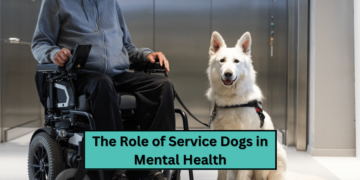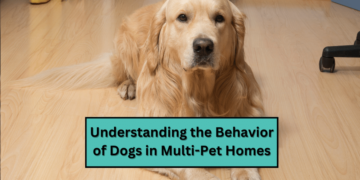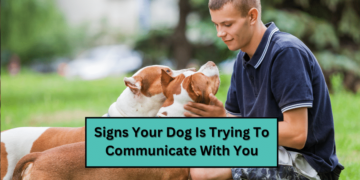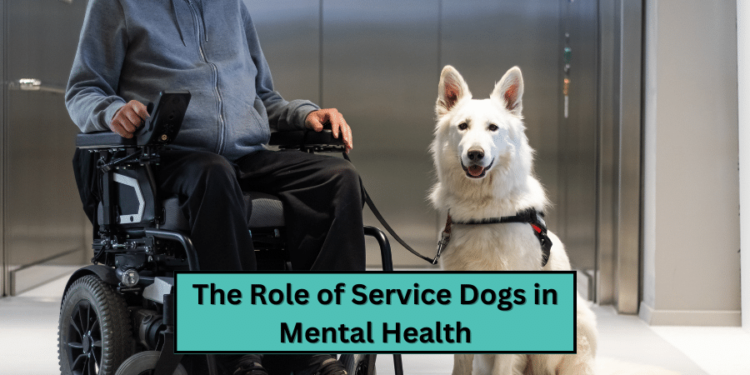Service dogs have long been celebrated for their roles in aiding physical disabilities, but their pivotal role in mental health is gaining recognition. These specially trained companions have become instrumental in supporting individuals battling anxiety, depression, PTSD, and other mental health challenges. Their tailored skills, intuitive responses, and comforting presence offer a unique, holistic approach to mental well-being. This article unravels the intricate role of service dogs in mental health, shedding light on their transformative impact on individuals and the broader mental health landscape.
Types of Service Dogs
Service dogs are an essential part of the support system for many individuals with varied needs. These dogs undergo rigorous training to ensure they can provide the necessary assistance to their handlers. Let’s delve into the different types of service dogs, particularly in the context of mental health.
-
Psychiatric Service Dog (PSD)
Psychiatric Service Dogs are specialized companions trained explicitly for individuals grappling with mental health conditions. This can include challenges such as anxiety, depression, and PTSD. Their role includes:
- Detecting signs of anxiety attacks before they fully manifest
- Interrupting self-harming behaviors
- Offering tactile stimulation during moments of distress
- Reminding handlers to take their medication.
-
Emotional Support Dogs (ESDs)
Emotional Support Dogs provide comfort and emotional relief. Unlike other service dogs, they aren’t specifically trained to perform tasks. However, their presence alone can significantly help individuals deal with emotional or psychological conditions. While they provide invaluable support, they don’t have the same legal privileges as service dogs.
-
Therapy Dogs
Distinct from both PSDs and ESDs, therapy dogs work in settings like hospitals, schools, and nursing homes, offering comfort and affection to many people. They play a pivotal role in:
- Assisting therapists during sessions
- Providing relief and joy to patients in hospitals
- Comforting students during stressful academic times.
-
Alert Dogs
A subset of service dogs, alert dogs, is adept at sensing and notifying their handlers about impending mental health episodes. For individuals with severe anxiety, PTSD, or other conditions, this can include:
- Notifying handlers of increased heart rates indicating panic
- Sensing emotional distress
- Alerting individuals before night terrors begin.
It’s crucial to understand that service dogs aren’t merely pets. They are essential companions trained to offer specific types of support, ensuring their handlers lead more manageable and fulfilling lives.
The Connection Between Service Dogs and Mental Wellbeing

The synergy between service dogs and mental wellbeing is both profound and intricately woven. These animals aren’t just pets; they are lifelines, offering an unyielding support structure for individuals navigating the choppy waters of mental health disorders. Each dog is meticulously trained to attend to the unique needs of their handler, rendering them not just companions but also caregivers in many respects.
Emotional Stability
Service dogs usher in a sense of emotional stability. Their unwavering presence acts as a source of comfort for many. Anxiety, depression, PTSD, and other mental health issues often usher in feelings of loneliness and isolation. The companionship of a service dog mitigates these feelings, instilling a sense of belonging and unconditional love.
Physical Contact
The power of touch cannot be underestimated. The physical contact between service dogs and their handlers often has a calming effect. It’s not just about the dogs responding to the emotional upheaval of their owners but also about the tactile connection that fosters a sense of safety and security.
Routine and Structure
For individuals with mental health issues, structure and routine can be pivotal. Service dogs necessitate a certain level of care, walks, feeding, and grooming. This can instil a sense of purpose and routine in the handler’s life, combating feelings of worthlessness or overwhelm.
Non-Judgmental Companions
One of the most distinguishing traits of these dogs is their non-judgmental nature. They offer a safe space for emotional expression, free from judgment or stigma. For many facing mental health challenges, this unconditional acceptance can be a cornerstone for healing and coping.
Crisis Management
Service dogs are adept at crisis management. They’re trained to recognize the onset of panic attacks, anxiety episodes, or other mental health crises. By alerting the individual or someone else, or by providing comforting behaviors, they contribute to crisis mitigation.
Social Interaction
Finally, the role of service dogs in enhancing social interaction is undeniable. They often act as a bridge, encouraging social engagement and communication, which can be particularly beneficial for those who find such interactions daunting.
In essence, the role of service dogs in mental health is pivotal. It transcends the bounds of traditional support, offering an amalgamation of emotional, psychological, and physical support that is tailored to the individual’s nuanced needs. Each interaction, every alert, and all forms of support rendered are threads weaving the intricate tapestry of enhanced mental wellbeing.
Training and Certification
Training and certification processes are intrinsic to ensuring that service dogs are equipped to effectively assist individuals with mental health conditions. The journey from a puppy or untrained dog to a certified service dog is rigorous, ensuring each animal is adeptly skilled and emotionally attuned to their handler’s needs.
Selection Process
The initial phase involves selecting dogs with the appropriate temperament. Not every dog is cut out for service work; it requires specific traits like adaptability, calmness, and a keen responsiveness. Dogs that exhibit these attributes are then ushered into a comprehensive training regimen.
Basic Training
The foundational stage of training encompasses basic obedience and socialization. Dogs learn commands and behaviors that are essential for public decorum. This base is critical for the specialized training that follows, ensuring the dog is obedient, manageable, and sociable in varied environments.
Specialized Training
Here, the curriculum is tailored to meet the specific mental health needs of the handler. For instance, dogs designated for anxiety or PTSD support are trained to recognize and respond to signs of distress, panic, or anxiety. This can involve tactile stimulation, space creation, or even initiating an alert to a third party in the event of a crisis.
Scenario Training
Service dogs undergo scenario-based training to acclimate them to real-life situations. They are exposed to different environments and stimuli to gauge and enhance their responsiveness. This ensures the dog is unflappable and efficient, regardless of the setting or circumstances.
Certification
Post-training, the dogs undergo an assessment to earn their certification. It’s a testament to their competency and alignment with the established standards for service dogs. Certification also often involves ensuring the dog’s wellness, including regular vet check-ups, vaccinations, and overall health assessments.
Handler Training
An often overlooked but crucial component is the training of the handler. Individuals receiving the service dog are educated on care, management, and the working relationship between them and their dog. This fosters a symbiotic relationship, enhancing the efficacy of the service dog in supporting mental health.
In sum, the training and certification of service dogs are thorough and meticulous, ensuring that each dog is not just physically equipped but also emotionally attuned to support the mental wellbeing of their handlers effectively. Their role in the intricate dance of mental health support is a testament to the multifaceted and nuanced nature of healing and coping in the realm of mental health.
Benefits of Service Dogs in Mental Health
The integration of service dogs into mental health support paradigms has profoundly influenced the therapeutic landscape. These specially trained companions bring a suite of benefits that transcend conventional methods, offering holistic and personalized support to individuals grappling with mental health conditions.
Emotional Support and Companionship
Service dogs offer unwavering companionship, alleviating feelings of loneliness and isolation that often accompany mental health issues. Their presence provides a source of comfort, fostering emotional stability and resilience.
Anxiety and Stress Reduction
Through their trained behaviors and responses, service dogs can sense and alleviate anxiety and stress. Their ability to engage in specific actions, such as providing tactile comfort or creating a physical barrier in crowded spaces, serves to mitigate acute anxiety episodes and daily stresses.
Enhanced Safety and Security
For many, the presence of a service dog instills a sense of safety. They are trained to respond to crises, providing immediate support and, in certain cases, alerting others to the emergency, thus enhancing the individual’s overall sense of security.
Boost in Self-Esteem and Confidence
The responsibility of caring for a service dog can instill a sense of purpose and achievement, bolstering self-esteem. Moreover, the dog’s unconditional positive regard uplifts the individual’s self-worth and confidence.
Improved Social Interaction
Service dogs can serve as social catalysts. Their presence can make social environments more approachable and encourage interaction, thereby aiding in overcoming social anxiety and fostering connections with others.
Routine and Structure
The routine involved in caring for a dog, such as feeding, walking, and grooming, introduces structure to the handler’s day. This routine can be grounding and stabilizing, contributing to improved mental wellbeing.
Physical Activity and Outdoor Exposure
Walking and playing with the service dog encourage physical activity and exposure to the outdoors. Physical exercise and nature have proven benefits for mental health, including improved mood and reduced anxiety.
Unconditional Love and Acceptance
Perhaps most significantly, service dogs offer unconditional love and acceptance. In the fluctuating tides of mental health, the consistent and non-judgmental companionship of a service dog is a beacon of emotional safety, acceptance, and love.
In conclusion, the multifaceted benefits of service dogs in mental health accentuate the profound impact they can have on the lives of individuals. Beyond the tangible support, they offer an unwavering companionship that navigates the intricate pathways of mental health with grace, understanding, and profound adaptability.
Challenges and Considerations
While the advantages of utilizing service dogs for mental health are significant, it’s crucial to also acknowledge the associated challenges and considerations. This balance ensures that both the handler and the dog have a positive, healthy experience.
Financial Commitment
Owning a service dog incurs expenses, including food, healthcare, grooming, and training. It’s essential to consider whether the financial investment is feasible and sustainable over the long term.
Time and Energy
Training and caring for a service dog require considerable time and energy. For individuals with mental health issues, there may be days where managing one’s own health is particularly challenging, let alone the added responsibilities of caring for a dog.
Public Perception and Interaction
Navigating public spaces with a service dog can sometimes draw attention and curiosity from others. Handlers should be prepared for interactions with the public and potential questions about the necessity and role of the service dog.
Dog’s Welfare
The welfare of the service dog is paramount. Ensuring the dog’s physical, mental, and emotional needs are met is an integral part of having a service dog. This includes regular exercise, mental stimulation, healthcare, and social interaction.
Legal and Ethical Responsibilities
There are legal and ethical responsibilities tied to owning a service dog. Understanding the laws, rights, and responsibilities in your jurisdiction is essential to ensure the ethical treatment of the service dog and adherence to legal guidelines.
Long-Term Commitment
Having a service dog is a long-term commitment, often spanning many years. Prospective handlers should consider their readiness to integrate a service dog into their lives permanently.
Training Adaptability
Even with training, there might be situations where the dog’s behavior is unpredictable. Handlers need to be equipped with skills to manage such scenarios effectively, ensuring the safety and wellbeing of the dog, the handler, and the public.
Navigating these challenges necessitates comprehensive preparation and awareness. By addressing these concerns proactively, individuals can maximize the benefits of having a service dog for mental health while mitigating potential drawbacks, ensuring a harmonious and supportive partnership.
Frequently Asked Questions

1. How Do Service Dogs Support Individuals with Mental Health Issues?
Service dogs are trained to perform specific tasks that assist individuals in managing and alleviating symptoms associated with mental health conditions. These can include anxiety attacks, depression, PTSD, and more.
2. Can Anyone Get a Service Dog for Mental Health Support?
Acquiring a service dog requires a professional evaluation to determine if a service dog would be beneficial. It’s based on the individual’s specific needs, challenges, and the severity of the mental health condition.
3. What Training Do Service Dogs Undergo?
Service dogs undergo extensive training to perform tasks tailored to the individual’s needs. They are trained to behave impeccably in public places, respond to crises, and provide emotional support.
4. Are Service Dogs Allowed in Public Spaces?
Yes, service dogs are permitted in most public spaces, including areas where pets are typically not allowed. Laws and regulations vary by country and region.
5. How Do I Apply for a Mental Health Service Dog?
Application processes vary by organization. Generally, it involves a thorough assessment of the individual’s mental health needs, a review of medical history, and an evaluation to determine the appropriateness of a service dog.
6. How Long Does It Take to Train a Service Dog?
Training duration varies but it typically takes several months to a couple of years to fully train a service dog. The dog’s individual learning pace and the specific tasks they are being trained for play a significant role.
7. Can I Train My Own Service Dog?
While it’s possible to train a service dog independently, it’s often recommended to seek professional assistance to ensure the dog is adequately prepared to support the individual’s specific mental health needs.
8. How to Differentiate Between a Service Dog and a Regular Pet?
Service dogs are typically identified by a vest or harness. However, the absence of these does not mean the dog isn’t a service animal. It’s always best to ask the handler if unsure.
Wrapping Up
The role of service dogs in mental health is undeniably transformative. These exceptional canines are not only companions but lifelines for many individuals navigating the tumultuous waters of mental disorders. They bridge the gap between traditional treatment methods and everyday life, offering a semblance of normalcy and enhanced quality of life. With their tailor-made training, service dogs become an extension of the healing and coping process, grounding, and empowering individuals to face the world with renewed strength and confidence.




















































Discussion about this post